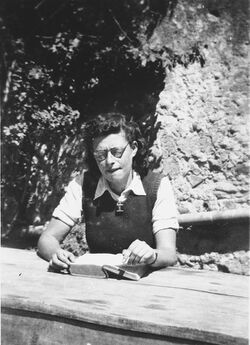Edith Goldapper Rosenthal (F / Austria, 1924-2021), Holocaust survivor
Edith Goldapper Rosenthal (F / Austria, 1924-2021), Holocaust survivor
- KEYWORDS : <Children of La Hille> -- <Austria, Germany> -- <Refugees, Belgium> <Home General Bernheim> -- <Refugees, France> <Seyre> <Chateau de La Hille> <Hidden Children, France> -- <Refugees, Switzerland>
Biography
Edith Rosenthal (born Edith Goldapper) is the daughter of Leo Goldapper and Sofie Rosenzweig Goldapper. She was born on November 12, 1924 in Vienna. Austria. Her father, an Austrian war veteran, lost both eyes in combat. As a wounded veteran, the government gave him a stationary and tobacco store to support his family. In March 1938, Germany annexed Austria, and soon thereafter, the new government seized his store. That December, Edith's parents sent her on a Kindertransport to Belgium. Along with other Jewish children from Germany and Austria, Edith stayed in the General Bernheimchildren's home, in Zuen. Following Germany's invasion of Belgium in May 1940, she, along with the other Jewish refugee children, was evacuated to Seyre in southern France. After spending the winter in rather primitive conditions, the children were moved to La Hille, an isolated chateau. Edith came to La Hille in May 1941 and lived there in relative safety for over a year. She was sporadically able to correspond with her parents through the intermediary of Secours Suisse, a branch of the Swiss Red Cross. Early one morning in August 1942, Edith's life became suddenly endangered when French gendarmes raided la Hille. Some forty of the home's oldest children, including Edith, were rounded up and sent to Le Vernet, a nearby concentration camp, to await deportation to the East. Edith remained at Le Vernet for a few weeks until the Secours Suisse negotiated for the release of the adolescents. Edith remained in La Hille for another year while awaiting a chance to escape to Switzerland. In November 1943 she was given false papers under the name Eve Germain and went to live with Victoria Cordier, a member of the French resistance. The following month, on December 12, 1943, Victoria escorted Edith over the Jura Mountains into Switzerland. That night, Edith went to the parents of Anna-Marie Piguet, a staff member at La Hille, and the following day Mrs. Piguet brought her to Zurich. However, rather than obtaining freedom, Edith was arrested shortly after her arrival and imprisoned for approximately a month. After her release, she was sent to quarantine and refugee camps in Ringlikon and Rikon. She then managed to be transferred to girls' camps in Fribourg, Neuchatel, Lucerne and Montreux where she worked as a stenographer and secretary. Only in 1947 could Edith live freely outside the confines of a camp. She went to work for a Jewish refugee organization in Zurich. In 1953, she received an affidavit from Mr. Bulova, president of the watch company, to immigrate to the United States. Mr. Bulova gave affidavits a group of survivors without any immediate family. After the war, Edith learned that though her father thought he had permission as a war veteran to remain in Vienna, the Nazis arrested her parents in April 1942. They were sent to Izbica concentration camp outside Lublin and murdered.
External links
- Holocaust Children, 1924 (subject)
- Holocaust Children, Austria (subject)
- Kristallnacht (subject)
- Holocaust Refugee Children, Belgium (subject)
- Home General Bernheim (subject)
- Holocaust Refugee Children, France (subject)
- Seyre (subject)
- Chateau de La Hille (subject)
- Switzerland from France (subject)
- Holocaust Refugee Children, Switzerland (subject)
